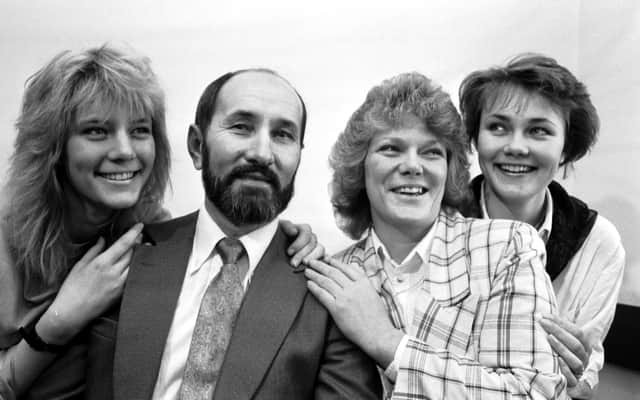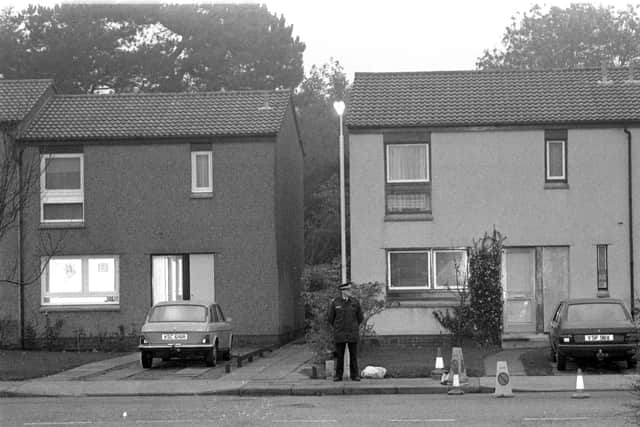Nikola Stedul: My father retained his love for Scotland - Monika Stedul


He died at home here in Zagreb, on 15 March, just as the plum trees were bursting into blossom.
I grew up in Scotland, where he, an exiled activist for Croatian independence, regaled my sister and I with stories of the trees in his homeland - apple, walnut, plum, fig, cherry - groaning under the weight of their sweet and nutritious burden.
Advertisement
Hide AdAdvertisement
Hide AdWith shining eyes, he recalled how as a boy throughout the long hot summers he and his friends from the villages would feast on fruit until they were fit to burst.


Their parents made jams, dried the fruits, or made the local moonshine, leaving the insect infested or rotting fruits to feed the birds and other animals, or replenish the fertile soil.
Viewed from Kirkcaldy, where Wm Low’s plums were hard and tasteless, and summer weather lasted about as long as the two weeks of Wimbledon, Croatia seemed like a magical fairy tale.
My father, Nikola Štedul, drew his last breath in his beloved Croatia, but he always retained his love for Scotland, the land that had given him refuge for almost 20 years.
Advertisement
Hide AdAdvertisement
Hide AdA special place in his heart was reserved for Kirkcaldy, where we had lived since the 1970’s, until he was able to return to the independent Croatia he had devoted his life to achieving, following the referendum for independence in 1991.
His love for my Scottish mother, and his respect for her deep connections with her birthplace meant Scotland was an obvious choice as the place to raise their two daughters when we emigrated from Australia, where they had met, to Europe.
My sister and I grew up as fully integrated Scottish lassies.
With no Croatian community in Scotland, and my father too busy working to teach us the language, our Croatian identities were forged almost entirely from our relationship with him and the work he and my mother were doing in their quest for Croatian independence.
Advertisement
Hide AdAdvertisement
Hide AdAs a child, Croatia was a mythical land with fruit laden trees, sparkling aquamarine seas, great weather and warm and funny people, just like him. Later I understood that it was also a place with a tragic and complex history, one that he believed should be not be brushed aside, but addressed courageously and honestly.
He was determined that history, be that of an individual or of a nation, should never be abused to deny people their basic human rights.
He loved all those things that tug on visitors’ hearts when they visit Scotland, the desolate mountains, sweet peaty air, rugged coastlines, working fishing villages, malt whisky, fish and chips … but he was also impressed by Scotland’s long history of resilience and the enduring democratic struggle by many of its citizens for a self-governing and modern independent nation. He believed in a person’s natural affinity for independence.
Robert Burns sums it up in his poem Man Was Made To Mourn: ”If I'm design'd yon lordling's slave / By Nature's law design’d / Why was an independent wish / E'er planted in my mind?”
Most of all, he had an abiding love for Scotland’s people.
Advertisement
Hide AdAdvertisement
Hide AdHe learned to speak English fluently, although after living in Australia, it took him a while attune his ear to the formidable Fife accent.
In 18 years of living and working in Scotland he never experienced a single act of racist hostility or abuse, despite his own heavy Eastern European accent and distinctly darker olive skinned complexion. Nor did that fact surprise him.
He had always lived by the philosophy of: “We’re a’ Jock Tamson’s Bairns”, a phrase he was delighted to learn from my great granny in Kirkcaldy, and in his experience most ordinary decent folk felt the same.
His work in calling for the human rights and dignity of people in Croatia (and by extension, the rest of Yugoslavia) to choose their own destiny in accordance with the same rights and values afforded to those in modern democracies, was seen as extremely dangerous to the Yugoslav authorities.
Advertisement
Hide AdAdvertisement
Hide AdBecause despite giving the impression of a ‘communist-lite' nation, enormous effort and resources in Yugoslavia were spent on ensuring opposition voices were stifled, discredited or eliminated - or as in the case of my father, all three.
Following years of injustice, that included branding my father a terrorist, denying him a passport or British citizenship, bugging our phones and having Special Branch (and even some of our neighbours) monitor us, a Yugoslav State assassin was sent to Kirkcaldy in 1988 to murder him.
Those old enough to remember will vividly recall that event and the wide coverage it received - although only in Scotland!
Briefly, after being shot six times, twice in the head, he miraculously survived and by a series of coincidences, and our good fortune that Scotland has a law system independent from the rest of the UK, the assassin, Vinko Sindičić, was caught, tried and as far as know is still the only known Yugoslav secret intelligence assassin ever to be convicted.
Advertisement
Hide AdAdvertisement
Hide AdHe was sentenced to imprisonment in Perth for 15 years, only to be extradited to Croatia after serving 10 years, ostensibly to stand trial there for another murder - that of my father’s friend, fellow activist and journalist Bruno Bušić, who was shot in Paris in 1978.
The extradition turned out to be a useful means of springing Sindičic from prison by his intelligence overlords still operating in Croatia.
From that time until this, my father's would-be killer has lived in freedom while Bruno’s assassination remains unsolved, as do many others.
Until his last dying breath my father was determined to finish the work to which he had devoted his life; to secure freedom and justice for a land, its people and his family, all of which he so dearly cherished.
Advertisement
Hide AdAdvertisement
Hide AdThere is much work still to do, which he wrote of in his memoirs, "U Službi Savjesti” - In the Service of Conscience, that I am currently translating into English.
But he died peacefully with 84 years of hard work, love and adventure behind him and above all, with the satisfaction of seeing his sacrifices rewarded and his life’s dream - the creation of an Independent State of Croatia, come to fruition.
As I spit the seed out over the balcony and pick another plum, I’m choked up with the memory of this gentle man taking his time to carefully assess the colour and firmness of each plum on his beloved tree before picking the most ripe and delicious fruits to share with his grandchildren.
